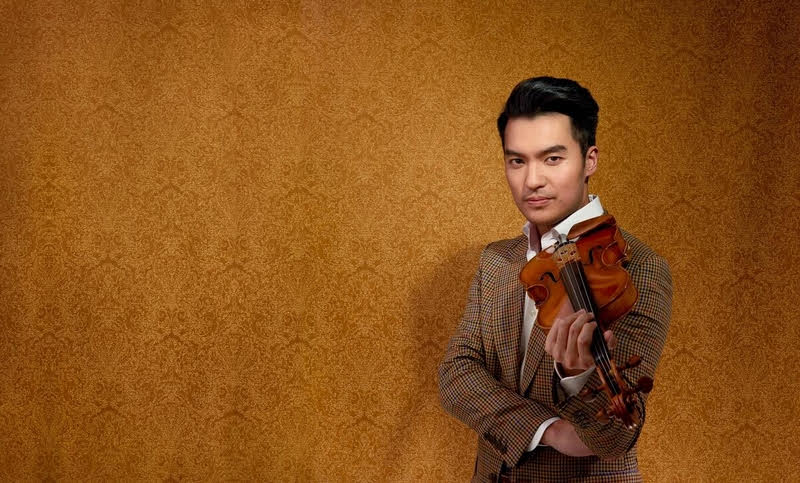
On Saturday night, the German conductor and composer, Matthias Pintscher conducted the LA Phil in three works, Masaot/Clocks Without Hands by the Austrian composer Olga Neuwirth, the Violin Concerto in E minor, Op. 64, with the Taiwanese/Australian violinist Ray Chen as soloist, and the Piano Quartet in G minor, Op. 25 by Brahms, orchestrated by Arnold Schoenberg.
Pintscher is finishing out his decade-long tenure as music director of the Ensemble Intercontemporain (EIC), which was founded in 1980 by Pierre Boulez to promote new music. It is only appropriate that Pintscher led the EIC as he himself is a well-known composer. Thus, it is no surprise that he programmed Neuwirth’s contemporary work for this concert.
According to Neuwirth, the Masaot/Clocks Without Hands represents a musical river journey down the Danube on which her grandfather grew up. The piece was originally commissioned by the Vienna Philharmonic for the 100th anniversary of Gustav Mahler’s death. The piece frequently juxtaposes dissonance, mostly in the strings, with familiar melodies in the horns and sometimes the winds, not unlike the kinds of German folk melodies often used by Mahler in his symphonies.
Masaot/Clocks is first noteworthy for the recurring use of three traditional metronomes. The piece challenges the musicians to play their instruments in very different ways than many orchestral works. In the end, Neuwirth achieves her musical goal of telling the many stories of her grandfather’s life along the Danube by combining fragments of melodies always against a backdrop of dissonance.
As a contemporary composer himself, Pintscher, who shares with Neuwirth that they both studied with the Austrian composer Hans Werner-Henze, displayed an easy understanding of Neuwirth’s composition; and the Phil showed their versatility in accommodating the many unusual demands the score places upon them.
After the orchestra thinned out, Pintscher finished the second half of the concert with something completely different: the E minor Violin Concerto by Mendelssohn with the young (he looks younger than his 33 years) phenom Ray Chen. Chen strode onstage to cheers looking like he was itching to get his fingers moving. And once he started, his playing throughout was dazzling, if not somewhat harsher than one might like in the Mendelssohn concerto, which has many moments of calm beauty. But no one could question Chen’s technique. And he didn’t just play the piece — he performed it, arching his back with the upbows and putting his whole body into it.
Pintscher’s accompaniment in the Mendelssohn was so sensitive and responsive that, given Chen’s showmanship and thrilling playing, one almost forgot that there was an orchestra accompanying him. That’s the sign of a great conductor, one who takes the spotlight off the orchestra and puts it where it belongs: on the soloist.
At the rousing conclusion, Chen appeared genuinely humbled by the audience’s resounding appreciation.
When he returned to the stage to perform an encore, Chen talked to the audience as if he knew everyone personally, first giving a shout-out to his fellow Aussies and then introducing the encore, Waltzing Matilda. Yes, that’s right, Waltzing Matilda. After explaining that the story behind the song is much sadder than most renditions of the piece, Chen played his own interpretation for solo violin, which consisted of a series of melancholy variations on the theme. It was quite a tour de force, and it garnered more cheers and applause from the audience.
The concert concluded with the Brahms/Schoenberg. Now I have to say that when a world-class orchestra like the LA Phil plays the works of great composers, the result is always splendid, even if reviewers have their own personal bones to pick with the interpretation. But sometimes, just sometimes, a performance grabs the listener from the very start and doesn’t let go until its conclusion. I have experienced this several times in my long time as a classical music listener. On Saturday night, Pintscher produced such an effect with the Brahms/Schoenberg.
The G minor quartet is brimming with melodies that are so catchy that it is as if one has heard them forever. And, difficult as it is to believe, Schoenberg’s brilliant orchestration in some ways renders a magnificent work even greater.
Pintscher was in a zone, and so was the audience. The soaring melodic lines by Brahms orchestrated by Schoenberg carried the audience along for a thrilling ride. And the LA Phil, as always, performed at the top of their game. I’m sure Brahms would have approved.
Oddly, many concertgoers left during intermission after the Mendelssohn. It’s always curious to me why one would pay for a ticket and then leave before the concert, featuring a world-class orchestra performing a masterpiece, is finished. In this instance, those who left missed an inspired performance by Pintscher and the Phil.
—Henry Schlinger, Culture Spot LA
Photo credit: Ray Chen / photo by John Mac courtesy of LA Phil





